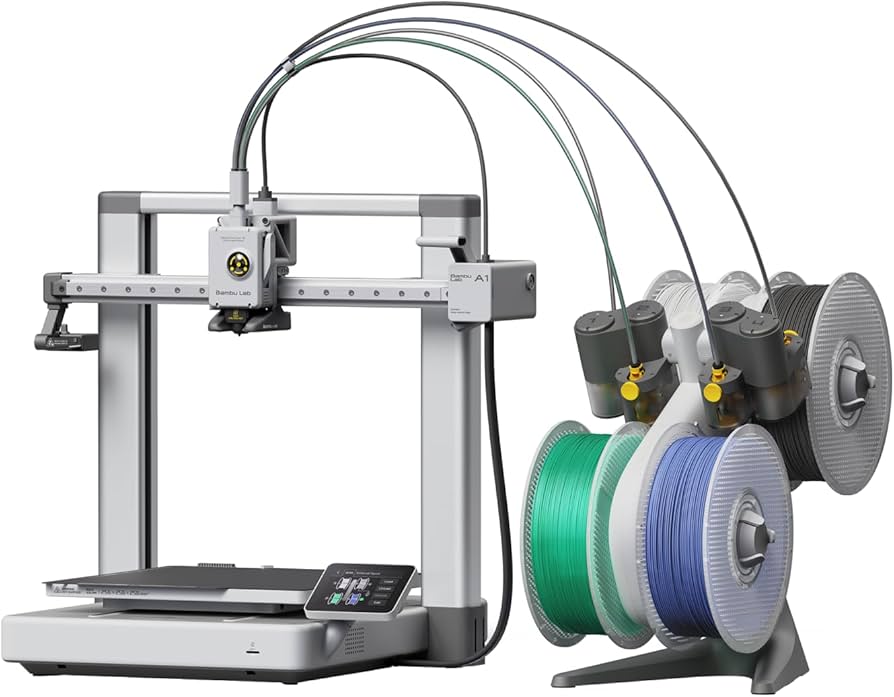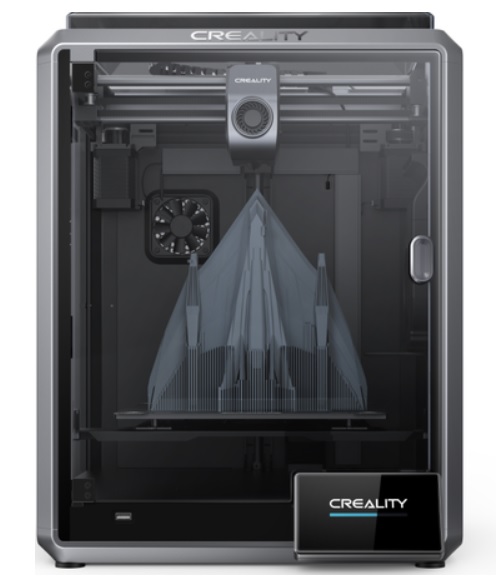Compare A1 vs K1C
Comparison between the best 3D printers
Choose the best 3D printer at the best price. The cheapest 3D printers are here.
Buy a 3D printer here with 3D Fila.
 |
 |
|
| Model | A1[BUY A1] |
K1C[BUY K1C] |
| Printing Material | Filament | Filament |
| Buy Filament for Bambu Lab A1 | Buy Filament forCreality 3D K1C | |
| Estimated price | $700,00 | $449,00 |
| Manufacturer | Bambu Lab | Creality 3D |
| Release Year | 2023 | 2024 |
| Print Volume [mm] | 256x256x256 | 220x220x250 |
| Printer Size [mm] | 385x410x430 | 355x355x480 |
| Weight [kg] | 8,3 | 12,4 |
| Power Loss Recovery | YES | YES |
| Enclosed printer | NO | YES |
| Bed Leveling | Automatic | Automatic |
| Filament End Sensor | YES | YES |
| Bed type | Heated | Heated |
| Power supply system | Direct Drive | Direct Drive |
| Standard nozzle | 0,4 | 0,4 |
| Maximum Nozzle Temperature [°C] | 300 | 300 |
| Maximum Bed Temperature [°C] | 100 | 120 |
| Maximum printing speed [mm/s] | 500 | 600 |
| Filament holder | YES | YES |
| Camera for supervision | YES | YES |
| Recommended filaments | PLA, PETG, TPU, PVA | ABS, PLA, PETG, PET, TPU, PA, ABS, ASA, PC, PLA-CF, PA-CF, PET-CF |
| Recommended slicers | SuperSlicer, PrusaSlicer, Cura, OrcaSlicer | Creality Print; Cura, Simplify3D e PrusaSlicer |
| Maximum Resolution [mm] | 0,1 | 0,1 |
| Processor | ||
| Display | Touchscreen 3,5 | Display touchscreen 4,3'' |
| Power Supply | 350 W | 110/220V / 350W |
| Connectivity | Wi-Fi, Bambu-Bus, Cartão Micro SD | Ethernet / USB / Wi-Fi |
| Operating systems | Windows, Linux, Macbook | Windows, Mac, Linux |
| Date of registration in the system | 2024-07-17 | 2024-05-16 |
| Release date | 2023 | 2024 |
| Extra features | The BambuLab A1 printer features fully automatic calibration, multi-color printing with the AMS system, active flow rate compensation, quick nozzle change with a clip, active motor noise cancellation, a build volume of 256x256x256 mm³, a maximum extruder temperature of 300°C, and a heated bed of up to 100°C. In addition, it has high precision, a machine health management system and an intuitive 3.5-inch touchscreen interface. | The Creality K1C is a fully enclosed CoreXY 3D printer featuring an all-metal extruder, tri-metal Unicorn nozzle for abrasive materials, automatic bed leveling with nozzle cleaning, AI-assisted failure detection, built-in camera for timelapse, enhanced cooling system, root access to Klipper firmware, and compatibility with PLA-CF, PA-CF, PET-CF, TPU, ABS, and more. |
| Support for multiple colors and materials (AMS and CFS) | YES | NO |
Notes * |
||
| Cost-benefit | 7 / 10 | 8 / 10 |
| Hardware | 4.2 / 10 | 4.8 / 10 |
| Tela | . | . |
| Print volume | 4 / 10 | 3 / 10 |
| Performance | 4 / 10 | 5 / 10 |
| [BUY A1] | [BUY K1C] |
Conclusion |
| In evaluating the Bambu Lab A1 and the Creality 3D K1C 3D printers, we must consider multiple factors including functionality, print volume, features, and cost-effectiveness. The Bambu Lab A1, while being slightly more expensive, offers a larger print volume and impressive features such as multi-color printing capabilities and active flow rate compensation. Its fully automatic calibration and intuitive touchscreen interface enhance user experience and facilitate ease of use. However, it is an open-frame printer, which might limit its appeal to users looking for a safer and more controlled printing environment. On the other hand, the Creality K1C stands out with its enclosed design, making it suitable for a wider range of materials, including those that may be more challenging to print. It also features user-friendly functionalities such as automatic bed leveling and AI-assisted failure detection, thereby catering to users who prioritize reliability and safety during printing. The K1C's slightly lower price point makes it a compelling option for budget-conscious consumers. In terms of performance, the K1C has advantages in material compatibility and print speed, while the A1 excels in precision features and printing technology. Ultimately, the best choice depends on the user’s specific needs: if larger print volumes and advanced features are a priority, the Bambu Lab A1 may be worth the investment. Conversely, for users valuing an enclosed design with versatility in material use at a lower price, the Creality K1C is a strong contender. Both printers offer solid performance but cater to different preferences in the 3D printing community. |

